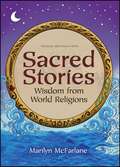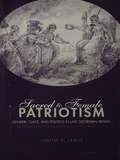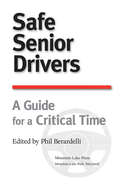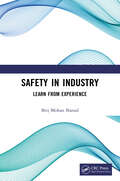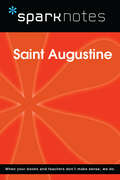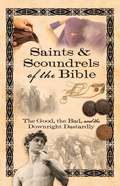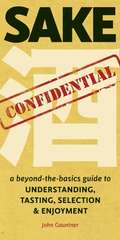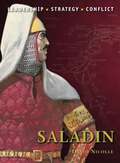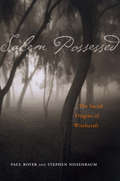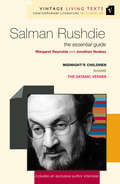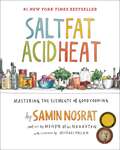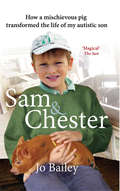- Table View
- List View
Sacred Stories: Wisdom from World Religions
by Marilyn Mcfarlane Caroline O. BergThis comprehensive collection of timeless and powerful stories puts the wisdom of world religions in the hands of young readers.When attempting to find a simple, engaging, and unbiased approach to world religions for her own family, Marilyn McFarlane discovered such a book did not exist. Understanding how important it is for children to build both respect for and knowledge of a variety of religions, regardless of their own faith, McFarlane created Sacred Stories: Wisdom from World Religions.Each captivating story and accompanying sidebar facts and spot illustrations brings to life the key tenets of a particular belief system, while the comprehensive glossary and resource list enable readers to expand their explorations. Including easy-to-understand descriptions and essential stories from Buddhism, Christianity, Hinduism, Islam, Judaism, Native American, and Sacred Earth, Sacred Stories is perfect for parents and teachers who want to expand young readers' understanding of world traditions.The simple, informative, unbiased language of Sacred Stories, combined with its comprehensive resource list and glossary, makes it an ideal learning tool for teachers, librarians, and other educators.
Sacred Stories: Wisdom from World Religions
by Marilyn McfarlaneThis comprehensive collection of timeless and powerful stories puts the wisdom of world religions in the hands of young readers.When attempting to find a simple, engaging, and unbiased approach to world religions for her own family, Marilyn McFarlane discovered such a book did not exist. Understanding how important it is for children to build both respect for and knowledge of a variety of religions, regardless of their own faith, McFarlane created Sacred Stories: Wisdom from World Religions.Each captivating story and accompanying sidebar facts and spot illustrations brings to life the key tenets of a particular belief system, while the comprehensive glossary and resource list enable readers to expand their explorations. Including easy-to-understand descriptions and essential stories from Buddhism, Christianity, Hinduism, Islam, Judaism, Native American, and Sacred Earth, Sacred Stories is perfect for parents and teachers who want to expand young readers' understanding of world traditions.The simple, informative, unbiased language of Sacred Stories, combined with its comprehensive resource list and glossary, makes it an ideal learning tool for teachers, librarians, and other educators.
Sacred to Female Patriotism: Gender, Class, and Politics in Late Georgian Britain
by Judith Lewis SMissing from much of the scholarship on 18th century British politics is recognition of the extensive participation of aristocratic women. Fortunately, as a literate and self-conscious group, these women created and preserved vast manuscript collections now available to historians. In Sacred to Female Patriotism, Judith S. Lewis taps into these sou
Safe & Sound: A Renter-Friendly Guide to Home Repair
by Mercury Stardust#1 New York Times BestsellerDon&’t panic—Mercury Stardust, AKA The Trans Handy Ma&’am is here to help!For too many people, the simple act of contacting a plumber or repair person can feel like a game of chance. As a transwoman and a professional maintenance technician, Mercury Stardust has discovered (the hard way) that we live in a world with much to fear. If you've ever felt panicked about opening your home to strangers in order to fix a maintenance issue, this book is for you.Renting a home can be a complex process—from finding a safe and affordable space, to hiring help for moving in and out, and of course, managing any repairs that come up during your stay. You deserve to feel empowered to take matters into your own hands—and it&’s not as hard as you might think. In this book, Mercury will show you how to tackle the projects that need improvement in your home—from how to properly fix a clog in your bathroom sink and safely hang things on your walls to patching small and medium drywall holes.Safe and Sound includes:Guidance for over 50 simple home maintenance projects, such as replacing your showerhead and troubleshooting a faulty garbage disposal.Chapters covering basic and handy repairs for your plumbing, electrical, carpentry, and safety needs. Advice tailored to renters to minimize permanent changes.Helpful illustrations and QR code links to videos to help you on your journey.Remember—a little bit of knowledge can go a long way toward making you feel more safe and in control of your own life.
Safe Foods: The A-Z Guide to the Most Wholesome Foods For You and Your Family
by Deborah MitchellOrganized in a quick-reference, A-to-Z format, Safe Foods will help readers separate the hype from the truth, find safe, healthy foods for their families, and answer some of today's most burning questions, including: - Are organic fruits and vegetables worth the extra expense? - What do experts really know about the safety of genetically engineered foods? - How concerned should a parent be about the hormones, steroids, and antibiotics in a child's diet?
Safe Senior Drivers: A Guide for a Critical Time
by Phil BerardelliThe post-World War II generation, the Baby Boomers, are beginning to retire at a time when U.S. life expectancy has never been higher. As a result, the population of senior drivers is exploding, a phenomenon that will create potentially massive problems for our traffic planners, highway safety engineers, and healthcare providers, as more and more Americans in their 70s, 80s, and even 90s continue to ply the roadways. Safe Senior Drivers is a unique, invaluable tool for keeping yourself--and your aging parent--as safe as possible on the roads. Packed with useful information and references, this guide is the clearest, most comprehensive resource available on what indeed is a critical time in the life of everyone who intends to stay behind the wheel and function well in today's driving environment.
Safe Young Drivers: A Guide for Parents and Teens
by Phil BerardelliTeenagers are by far the most dangerous age group on the road: a 16-year-old is 12 times as likely as older drivers to die in a crash as a single occupant; put two young teens in a vehicle, and the odds of death and injury nearly double. Safe Young Drivers helps to address this enormous problem. It is an indispensable guide for teaching teens to drive. Intended for parents and teens to use together, it addresses parental issues such as how to choose a car for your teen, and provides teens with simple instruction and important tips to remember. With simple graphics, a complete index, and a section called Some ABCs for the Road, Safe Young Drivers is a valuable tool for all new drivers and their teachers.
Safety and Security for Churches and Other Places of Worship
by Kevin L. Erskine Joy A. VolpiSafety and Security for Churches and Other Places of Worship is a reference book focused on how to form a first responder team for churches, synagogues, temples, and other places of worship. It will assist team leaders on how to train for both security and medical emergencies, provide training aids and ideas, and how to write SOPs and legal issues. Trending violence directed at soft targets is growing, forcing places of worship to respond with highly trained personnel to quickly intervene. Many medical incidents can have drastically better outcomes if trained medical personnel render immediate medical care. For instance, the use of an AED in conjunction with CPR can drastically improve survival rates from 15% to 85%, versus just CPR alone. Topics covered include: Environmental disasters Acts of violence Active shooter incidents Bomb threats Unruly/disruptive persons Suspect control Sexual abuse Realistic training using fake wounds Tabletop exercises Team building Medical emergencies An equipment chapter helps to determine what equipment is a priority for teams limited by budget. Some equipment can mean the difference between a "friend" being mistaken for an aggressor, resulting in an innocent person being injured or killed. Safety and Security for Churches and Other Places of Worship is a must-have reference for anyone charged with the duty to protect those who attend and work at places of worship.
Safety in Industry: Learn from Experience
by Brij Mohan BansalThis concise book presents years of the author’s practical experiences on industrial safety through various case studies. It aims to quip professionals in their respective industrial fields with different safety management systems, like the knowledge of common dos and don’ts, Standard Operating Procedures (SOP), and even the Emergency handling and use of PPEs. Print edition not for sale in South Asia (Bangladesh, Bhutan, India, Nepal, Pakistan and Sri Lanka)
Safire's New Political Dictionary
by William SafireSafire's definitions-- discursive, historically aware, anecdotal-- bring a savvy perspective to our colorful political lingo. It reads like a mini-essay in political history, and readers will come away with a fuller understanding of particular words.
Sahithya Mathrukakal - BCA Degree - Calicut university: സാഹിത്യ മാതൃകകള്
by McGraw-Hill Book Companyഒന്നാം സെമസ്റ്റര്, കാലിക്കറ്റ് സര്വകലാശാല, ബി.സി.എ / ബി.എസ്.സി., അദര് പാറ്റേണ് കോമണ് കോഴ്സിലെ – ഭാഷയും സാഹിത്യവും വിഷയത്തിനുളള മലയാളം സിലബസ് അനുസരിച്ച് കുറിപ്പുകളോടെ തയ്യാറാക്കിയത്. ലേഖനങ്ങള് (കണ്ടൽ ജീവിതം, ഞങ്ങൾ നിങ്ങൾക്ക് ഭൂമി വിറ്റാൽ, കലയും ആവിഷ്കാരവും), കഥകള് (വേണ്ടാംകടി, ലോല, ഒത്തുതീർപ്പുകൾ), കവിതകള് (ബുദ്ധനും ഞാനും നരിയും, കൊല്ലേണ്ടതെങ്ങനെ?, മീര പാടുന്നു, പല പോസിലുള്ള ഫോട്ടോകൾ) എന്നീ വിഭാഗങ്ങളിലായി പാഠഭാഗങ്ങള് ഒരുക്കിയിരിക്കുന്നു.
Sailing Essentials: All You Need to Know When You're at Sea (DK Sports Guides)
by Steve SleightWhether you are a novice or a sailor looking to expand your skills, this indispensable sailing companion will guide you every step of the way.A compact, easy-to-carry reference book, DK&’s Sailing Essentials is packed with all the essential information for practical sailors or just anyone who is interested in the topic. Start with the introductory section on comfort and safety to remind or familiarize yourself with the equipment on board and some basic knowledge, such as when to sail and what to wear. The following sections are full of practical advice on every aspect of sailing, from basic maneuvers to dealing with difficult weather conditions. There is also guidance on maintenance and repairs to ensure you know how to keep your boat in good shape, as well as clear instructions about tying a perfect figure-of-eight and other knots... and much, much more!Sailing Essentials is perfect as a skipper's back-up manual or a quick reference guide for novice sailors. You won't want to set sail without it.
Saint Augustine (SparkNotes Philosophy Guide)
by SparkNotesSaint Augustine (SparkNotes Philosophy Guide) Making the reading experience fun! SparkNotes Philosophy Guides are one-stop guides to the great works of philosophy–masterpieces that stand at the foundations of Western thought. Inside each Philosophy Guide you&’ll find insightful overviews of great philosophical works of the Western world.
Saint Katharine Drexel, Apostle to the Oppressed
by Lou BaldwinFrom the book: When the Catholic Church, through the intricate canonization process, declares an individual a saint, it gives recognition to the heroic virtue of his or her life, and says, "Beyond a doubt, this wonderful person has achieved what should be the goal of everyone - salvation." While canonization bestows a certain amount of honor and glory on the newly named saint, the real purpose is to present that holy man or woman as a worthy example for those of us still on earth. Katharine Drexel cannot be dismissed as a social worker in religious garb. Nor is she merely the foundress of a religious congregation for women. Her "heroic virtue" shines through on several levels. First of all, there is her own formation in an extraordinarily pious family, which looked beyond wealth to man's duty to man. There is also her own complete renunciation of money and the things it buys for service to others. There is her great love of God, best exemplified by her devotion to the Eucharistic Christ. There is her deep empathy with people of color, flying in the face of the prevailing prejudices of her day. And ultimately, there is her determination to help these same persecuted people know Jesus Christ, a commission accepted by all too few of her own co-religionists. Katharine Drexel became a saint, not by flat of the Pope, but by showing others a road to sanctity. Her path might be different than that of a St. Isaac Jogues, a St. Paul or a Dorothy Day - ultimately we choose our own path. But her example is one of the shining guideposts that can guide us as we journey in this new millennium.
Saints & Scoundrels of the Bible
by Howard BooksDiscover a new approach to Scripture with this imaginative way of looking at things that are right in front of us, all while delving deep into biblical truths. There are many ways to learn about the Bible, even if it seems to be totally familiar to us. It is, in fact, full of so many little known, interesting stories like the ones that rivet today's audiences -- full of intrigue and surprising changes of character. Broken up into individual sections, such as "Freaks and Geeks," "Dashers and Vixens," "Big Shots and Mug Shots," "Leaders and Laborers," and "Prophets and Losses," it can be read a bit at a time. Saints & Scoundrels of the Bible reveals many of the little-known facts about Scripture in an entertaining and informative manner, so the reader will be fascinated and constantly saying, "I didn't know that!" With chapters such as "The Trickster Trailed," "The Perils of Paul," "Tempting Tamar," "A Greedy Grandmother," and "The Deadly Dance," readers will turn each page to find out what happens next in these captivating tales. This clever new way of reading Scripture puts a light-hearted twist on old stories, all while drawing the reader closer to God's truth. There is nothing old or boring in this creative approach to learning about the Bible.
Saints, Angels & Demons: An A-to-Z Guide to the Holy and the Damned
by Gary JansenSaints, Angels, and Demons is an illustrated compendium of the fascinating lives and meaningful legacies of nearly 400 iconic figures who have influenced history, religion, literature, and art, throughout the centuries and across the world. From St. Augustine, whose writings helped shape Western culture to St. Bernadette, whose visions of Mary led to decades of holy pilgrimages by the faithful, and from Archangel Michael, defender of good in the face of evil to Asmodeus, the three-headed demon of lust, temptation, and destruction, the history of the saints and spiritual creatures is, in many respects, the history of the world. Award-winning author Gary Jansen weaves together the lives of the holy (and not-so-holy) beings who have graced and defiled our earthly realm from the first century BC to the present day. Organized alphabetically, the book provides lyrical capsule histories of nearly 400 figures describing their lives and the details of their most important contributions to the world. Each entry is accompanied by key information such as the associated signs and symbols, patronage, and feast days. A glossary and numerous appendices providing historical and religious context. For the faithful and the intellectually curious alike, Saints, Angels, and Demons is an essential reference and a comprehensive overview of the history of humanity, as told through a unique perspective.
Sake Confidential
by John GauntnerWith today's sake drinkers increasingly informed and adventurous, now is the time for a truly expert guide to take you deeper into appreciation of this complex but delightful Japanese beverage, brewed from rice and enjoyed both warm or chilled.And what better mentor than John Gauntner, the "Sake Guy" and the world's leading non-Japanese sake educator and evangelist? Here in over two dozen no-holds-barred essays, John reveals "the truth about sake" from a connected insider's perspective. No other book or website presents such a knowledgeable, practical, and concise yet complete guide to sake idiosyncrasies, misperceptions, and controversies.Sake Confidential is the perfect FAQ for beginners, experts, and sommeliers. Indexed for easy reference with suggested brands and label photos. Includes: Sake Secrets: junmai vs. non-junmai, namazake, aging, dry vs. sweet, ginjo, warm vs. chilled, nigori, water, yeast, rice, regionality How the Industry Really Works: pricing, contests, distribution, glassware, milling, food pairing The Brewer's Art Revealed: koji-making, brewers' guilds, grading John Gauntner John Gauntner is the only non-Japanese certified Master of Sake Tasting. A resident of Japan since 1988, he has worked in the sake industry promoting and educating since 1994. Each year he conducts Sake Professional Courses for sake professionals and aficionados, and several of his students have gone on to open thriving sake shops, breweries, and izakaya in the United States.
Salad Days: Recipes for Delicious Organic Salads and Dressings for Every Season
by Pam PowellFrom the creator of Salad Girl Organic Salad Dressings, a collection of recipes for creating salads and dressings using organic, locally grown ingredients.Savor fresh, artisan salads throughout the year with Pam Powell, creator of delicious Salad Girl Organic Salad Dressings. With a focus on organic greens, cheeses, nuts, and fruits from local sources, these creative salads not only burst with flavor, they are good for you. Recipes include Pea Sprout and Strawberry Salad with Strawberry Rhubarb Vinaigrette; Fresh Fig and Mesclun Salad with Sweet Honey Vinaigrette; Kale, Sausage, and Warm Potato Salad with Maple and Hickory-Smoked Bacon Dressing; Moroccan Couscous and Chicken Salad with Curried Orange and Fig Vinaigrette and many more. Sixty color photos, colorful illustrations, a salad basics chapter, and a resource guide complete this fantastic collection of salad and dressing recipes.
Saladin
by David Nicolle Peter DennisThis Osprey Command book looks closely at the early life, military experiences and key battlefield exploits of Al-Malik al-Nasir Yusuf Ibn Najm al-Din Ayyub Ibn Shahdi Abu'l-Muzaffar Salah al-Din - or Saladin as he is more commonly known outside the Islamic world - who is broadly regarded as the greatest hero of the Crusades, even in Europe. Most chroniclers present him as a man of outstanding virtue, courage and political skill. More recently, however, efforts have been made to portray Saladin as an ambitious, ruthless and even devious politician, and as a less brilliant commander than it normally thought. This book sets out to reveal that the truth is, as usual, somewhere in between.From the Trade Paperback edition.
Salem Possessed: The Social Origins of Witchcraft
by Stephen Nissenbaum Paul S. BoyerIn 1692 19 women and men were executed as witches and wizards in Salem, Massachusetts. Altogether, 142 people were arrested during the worst outbreak of witchcraft hysteria in North American history. By examining the social structure of Salem Village the authors attempt to explain why Salem Village was the setting for this appalling episode. They bring to light a variety of factors, including longstanding family feuds, political wrangling, and personality conflicts, which set the stage for the witchcraft drama.
Salman Rushdie: The Essential Guide (Vintage Living Texts #11)
by Margaret Reynolds Jonathan NoakesIn Vintage Living Texts, teachers and students will find the essential guide to the works of Salman Rushdie. Vintage Living Texts is unique in that it offers an in-depth interview with Salman Rushdie, relating specifically to the texts under discussion. This guide deals with Rushdie's themes, genre and narrative technique,and a close reading of the texts will provide a rich source of ideas for intelligent and inventive ways of approaching the novels.Also included in this guide are detailed reading plans for all three novels, questions for essay and discussion, contextual material, suggested texts for complementary and comparative reading, extracts from reviews, a biography, a bibliography and a glossary of literary terms.Texts covered: Midnight's Children, Shame and The Satanic Verses.Whether a teacher, student or general reader, the Vintage Living Texts series gives you the chance to explore new resources and enjoy new pleasures.
Salmon: A Cookbook
by Diane Morgan&“A beautiful cookbook with impressive photographs . . . Offers variety that any fish-lover will appreciate.&” —Publishers Weekly Diane Morgan is hooked on salmon and it shows. From the deck of a commercial fishing boat in Alaska to the fish farms in Scotland, she has traveled the world on a quest to find out everything there is to know about the world's favorite fresh fish. Learn the difference between wild and farmed salmon, discern among the varieties of species, whether Atlantic, Chinook, Coho, or Sockeye, and discover the heart-healthy benefits of including salmon in the diet. The real catch are the recipes. Salmon hash, thai coconut soup, salmon tacos, and a dramatic yet simple whole roasted version shows the incredible versatility of salmon—it&’s perfect morning, noon, and night. It pairs well with an international array of flavors and can be poached, smoked, baked, or grilled. With tips for storing, preparing, filleting, cutting steaks, taking out pin bones, plus gorgeous scenic photographs of famed fishing areas, Salmon is sure to make a big splash in the kitchen.
Salsa Dancing into the Social Sciences: Research in an Age of Info-glut
by Kristin Luker“You might think that dancing doesn’t have a lot to do with social research, and doing social research is probably why you picked this book up in the first place. But trust me. Salsa dancing is a practice as well as a metaphor for a kind of research that will make your life easier and better.” Savvy, witty, and sensible, this unique book is both a handbook for defining and completing a research project, and an astute introduction to the neglected history and changeable philosophy of modern social science. In this volume, Kristin Luker guides novice researchers in: knowing the difference between an area of interest and a research topic; defining the relevant parts of a potentially infinite research literature; mastering sampling, operationalization, and generalization; understanding which research methods best answer your questions; beating writer’s block. Most important, she shows how friendships, non-academic interests, and even salsa dancing can make for a better researcher. “You know about setting the kitchen timer and writing for only an hour, or only 15 minutes if you are feeling particularly anxious. I wrote a fairly large part of this book feeling exactly like that. If I can write an entire book 15 minutes at a time, so can you.”
Salt, Fat, Acid, Heat: Mastering the Elements of Good Cooking
by Samin Nosrat*More than 1 million copies sold * New York Times bestseller * Winner of the James Beard Award and multiple IACP Cookbook Awards * Available as a Netflix series * Transform how you prep, cook, and think about food with this visionary master class in cooking by Samin Nosrat that distills decades of professional experience into just four simple elements—from the woman declared &“America&’s next great cooking teacher&” by Alice Waters. Featuring more than 100 recipes from Samin and more than 150 illustrations from acclaimed illustrator Wendy MacNaughton!In the tradition of The Joy of Cooking and How to Cook Everything comes Salt, Fat, Acid, Heat, an ambitious new approach to cooking. Chef and writer Samin Nosrat has taught everyone from professional chefs to middle school kids to author Michael Pollan to cook using her revolutionary, yet simple, philosophy. Master the use of just four elements—Salt, which enhances flavor; Fat, which delivers flavor and generates texture; Acid, which balances flavor; and Heat, which ultimately determines the texture of food—and anything you cook will be delicious. By explaining the hows and whys of good cooking, Salt, Fat, Acid, Heat will teach and inspire a new generation of cooks how to confidently make better decisions in the kitchen and cook delicious meals with any ingredients, anywhere, at any time. Echoing Samin&’s own journey from culinary novice to award-winning chef, Salt, Fat Acid, Heat immediately bridges the gap between home and professional kitchens. With charming narrative, illustrated walkthroughs, and a lighthearted approach to kitchen science, Samin demystifies the four elements of good cooking for everyone. Refer to the canon of 100 essential recipes—and dozens of variations—to put the lessons into practice and make bright, balanced vinaigrettes, perfectly caramelized roast vegetables, tender braised meats, and light, flaky pastry doughs. Destined to be a classic, Salt, Fat, Acid, Heat just might be the last cookbook you&’ll ever need. With a foreword by Michael Pollan. *Named one of the Best Books of the Year by: NPR, BuzzFeed, The Washington Post, Chicago Tribune, Rachel Ray Every Day, San Francisco Chronicle, Elle.com, Glamour, Eater, Newsday, The Seattle Times, Tampa Bay Times, Tasting Table, Publishers Weekly, and more!*
Sam and Chester: How a Mischievous Pig Transformed the Life of My Autistic Son
by Jo Bailey-MerrittWhen Sam Bailey-Merritt was just two years old, almost overnight he lost the ability to communicate or function. His mother, Jo, was at a loss as to what to do as she saw her son grow increasingly isolated and begin to suffer from uncontrollable meltdowns. Eventually, Sam was diagnosed with autism.Sam's condition continued to worsen and, just when Jo had all but given up hope of being able to help him, the family went on a day trip to a nearby miniature pig farm. Sam immediately bonded with a tiny ginger piglet called Chester, who stood sad and alone, apart from the rest of the litter. The connection between the boy and the animal was immediate and their unusual friendship blossomed from the moment the family brought Chester home. The tiny pig refused to leave Sam's side - it was as if he knew that Sam needed a friend. And, for the first time in five years, Jo saw her son really laugh.While Sam's confidence grew, Chester grew in a different way: the micro pig that was supposed to become the size of a Cocker Spaniel in fact ballooned to three times that size - with hilarious consequences for the family! Chester has turned Sam's life around. He now has the ability to communicate his feelings, make friends and is caring and kind towards others.Sam and Chester is the heart-warming story of how a teacup-sized ginger pig helped to transform the life of a boy with autism. It is the emotional story of a mother's fight to win back her son.
